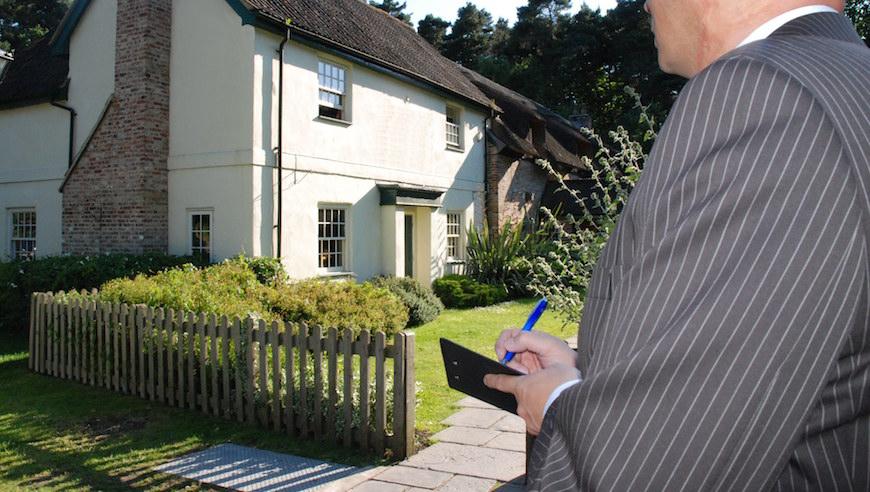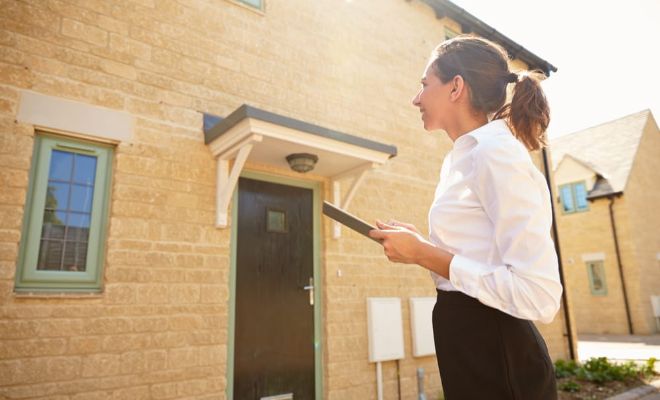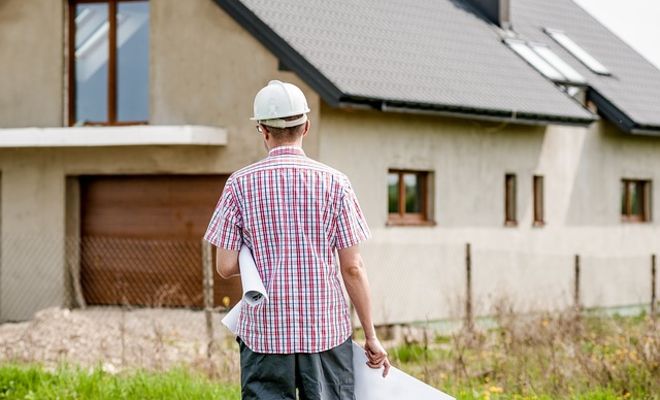House Survey Cost
Last updated 10th June, 2025
Interested in a typical house survey cost?
This article breaks down all the costs involved with different house survey types. We explain a home buyers survey, a building survey and a full structural survey and break down the prices involved. On average you can expect to pay between £350-£400 for a standard condition report, while other surveys may be priced higher.
Keep reading for more information!

Table of Contents
- How much is a house survey?
- Types of house survey
- House survey prices
- Additional costs
- Labour costs and time frames
- Cost affecting factors of a house survey
- What does a house survey involve?
- Mortgage valuation survey
- DIY house survey
- Do I need a house survey?
- Benefits of a house survey
- How to find & hire a house surveyor
- FAQs
- Sources
How Much Is a House Survey?
The average cost of a house survey should be somewhere in the region of £350- £400.
However, there are a lot of factors to consider when it comes to the final house survey cost. The first being what type of survey you want to have conducted.
Generally, there are five major types of house surveys, namely:
- Condition Report
- Homebuyers Report
- Home Condition Survey
- Building Survey
- Snagging Surveys
Types of House Surveys
Here is a quick review of each report and how much, on average, each house survey costs:
Condition Report
The price for this type of house survey is between £350 and £400, and as one of the more common surveys requested for properties that are relatively new and in good condition.
It includes surface level inspections that check for some of the more obvious problems. Although that said, it can potentially also reveal deeper issues, although it won’t highlight the full extent of the problem.
Homebuyers Report
This house survey report is a little more expensive (costing somewhere between £500- £600). While a condition report tends to be newer properties, a Homebuyers Report is one of the most requested surveys in general as it goes a little more in-depth.
Also, it doesn’t take too long as the surveyor should be finished in about 3 hours. Problems such as subsidence and damp are usually noticed at this level of surveying.
In addition, the professional surveyor might provide some solutions to fix the problems highlighted, which is of course included in the home report cost.
RPSA Home Condition Survey
This survey is specifically directed at residential homes and will set you back anywhere between £450-£1000.
The results are independently checked, and will uncover issues such as damp, structural cracks, faulty roofing, electrical problems, or signs of subsidence.
Building Survey
The cost for a Building Survey can be fairly high — anywhere between £700-£1000, although this may vary depending on the size and location of the property.
It is generally the most comprehensive house survey available, and ideal for any older properties, more unique builds or those in obvious need of attention.
It provides a detailed report on the property's overall condition, including any structural issues, defects, and recommended repairs.
Snagging Surveys
A new build Snagging Report will cost between £350-£500 and should only take a couple of hours at most.
This type of house survey is to focus on details that may have been missed during the initial construction.
The final cost of any of the surveys or reports listed above may vary depending on factors such as location, property type and size, as well as any accessibility or potential safety concerns.
House Survey Cost Breakdown Calculator
Average cost for a house survey - Total Cost: £700 (although this will vary depending on the size of property and the type of survey you require)
Materials
£70
Tradesmen
£630
Waste removal
£0
House Survey Prices
Below we've summarised the estimated cost for each of the house surveys mentioned, timewise they will mostly take 2 to 3 hours to complete, although a Home Condition Survey may take slightly longer. Whereas a House Building Survey, you should allow around 4 to 5 hours.
| SURVEY TYPE | PRICE |
|---|---|
| Condition Report | £350–£500 |
| Homebuyers Report | £500–£650 |
| Home Condition Survey (RPSA) | £450–£1000 |
| Building Survey | £700–£1000 |
| New Build Snagging Report | £350–£500 |
Additional Costs
Typically, when considering the full house survey cost, the most important factor is the size and value of the house.
However, this is the best case scenario, as you might find yourself having to spend more money if there are any issues revealed during the process. Below, we’ll examine some of the most common problems a surveyor might encounter and what to do in these situations and the costs involved to rectify them.
Damp
Depending on the size of your home, the cost of a damp survey should be between £200- £400 and shouldn’t take more than two hours.
Simply put, damp is a problematic condition that can affect the building’s structure. It is built-up moisture that slowly seeps through the building causing damage over time.
Unfortunately, this is a rather common problem in the UK due to weather conditions. If you feel there might be a damp problem in your home, it is advisable to engage a professional as soon as possible.
If your house has a damp problem, the surveyor will advise you on steps to take to handle the problem.
Electrical Issues
Depending on the size of the house, the cost of rewiring a house should be between £1500- £3500.
If you purchase an older home, there is a possibility that it would have electricity issues brought on by age. Therefore, it is possible that rewiring the house is necessary for which you’ll need to engage an electrician.
This will include hourly rates, external help, and so on. The electrician will have to ensure that they fit in new, and secure electrical outlets to improve the safety of the house.
Heating Issues
The most common heat issues is when the central heating system needs flushing.
In this instance, it's a job that can cost anywhere from £300 to £500. This can take most of the day to complete, and requires a certified plumber to fire up the boiler and check all the radiators for cold spots.
Structural Issues
In the worst case scenario, you may need to call in a structural engineer - costing on average between £50 to £90 per hour, although the overall cost will depend on how long the review takes.
This need often arises when a house survey uncovers structural issues, such as crumbling walls or unstable foundations, that require further evaluation from a qualified expert.
In such cases, hiring a structural engineer may be essential to fully understanding the extent of the problem and the work that needs undertaking.
It's important to remember any inspection fees are separate to labour or repair costs, which will need arranging separately, meaning the overall expense can add up quickly. However, the role of a structural engineer is highly important as your safety could be at risk if you proceed without any checks put in place.
Discovering these issues early can work to your advantage, as it might allow you to negotiate a lower price with the seller. Alternatively, if the repairs prove too costly, you may decide not to go ahead with the purchase.
Either way, finding major defects before you commit can save you money and help you find a more secure investment if necessary.
Labour Costs and Time Frames
As previously mentioned, there are generally five house survey types carried out, and the cost varies depending on the type you go for. But there is no seperate labour costs as such, as the cost for a survey is in all-in-one.
For any house survey, it should take 2-3 hours to complete.
Cost Affecting Factors of a House Survey
Survey costs buying a house are very important as they determine how good a deal you’re getting.
For instance, if you spend significantly on surveys for a home which has to undergo repairs, you’ll have to wonder if it is worth it.
On top of that, there are a couple of factors that could alter the price of the project, some of which will be examined below.
Size of the House
Typically, the larger a house, the more money it will cost to have it surveyed. As you can imagine, larger homes have more places to check, which means the surveyor will likely spend more time checking for issues to report.
So, a 5-bedroom home will cost a pretty penny while a two bedroom apartment will be relatively affordable. However, you might be able to score a sweet deal with the professionals if you have a larger home as they might reduce the amount you’ll pay per square foot.
So, while a three bedroom home might cost somewhere between £350-£400, a six bedroom apartment might be around £600.
Location
Time is an important factor when pricing a job, and for this reason, it is always best to go for a local surveyor. For professionals who travel significant distances to reach your home, you might have to pay a bit more.
Most professionals charge labour from the moment they step out of their offices which means a lengthy travel time could really increase the price.
In addition, surveyors in remote areas could cost more due to less competition, and more demand. However, if you trust the surveyors who are coming to do the job, then the extra money might be worth it.
Ease of Access
This usually pertains to the difficulty a surveyor might encounter while on the job.

For instance, if your home features difficult terrain, your surveying costs might be more as the professional has to overcome some challenges. Also, a home with a complicated layout that might be more difficult to investigate will also attract higher fees to compensate the professional for the work done.
Type of House
This is also an important consideration as it affects the amount of money the surveyor will request.
For instance, a flat home with no stairs or upper levels will be a lot cheaper than a home with all the bells and whistles.
Therefore, duplexes of homes with multiple floors could cost quite a bit more than typical homes.
Type of Survey
Finally, the type of survey is also pretty important as it determines the amount of work the surveyor will put in.
For example, a condition report only requires the tradesperson to have a cursory glance around the place to ensure that everything is in place.
Therefore, it wouldn’t cost as much as the other types of surveys. Conversely, homebuyers report and building surveys involve significantly more work which includes reports and recommendations in case of problems.
Hence, they will set you back more than other types of surveys.
What Does a House Survey Involve?
You might be tempted to believe that a surveying job is easy since all the professional does is effectively look around the house to ensure that everything is running smoothly.
However, this would be a wrong assumption as their job involves a lot of work, and there are several things a surveyor will notice that you would otherwise miss.
In this section, we’ll examine the checks a surveyor has to run through to ensure that the house is safe.
The Property
This might not take too long, but it is important that the surveyor has a look at the property in its entirety.
So, factors like distance to other houses, the road, and so on are all taken into consideration in this situation.
History
The building’s history is of great importance to the surveyor. This is because it provides information as to some of the potential problems that could be found.
For instance, older homes are likely to have outdated wiring which might need the attention of an electrician.
Therefore, knowing the age of the building will help the surveyor do a better job and focus on a couple of areas that need scrutiny.
Roof
Next up, the surveyor will likely take a look at the roof to ensure that it is in good shape. To achieve this, the surveyor will try to get a good look at the roof from different angles.
Additionally, the surveyor will also inspect the coverings and gutters around the roof to determine if they are in good shape.
Walls
Walls make up a significant portion of the house, and it is incredibly important that they are in good condition as the opposite could cause you potential harm.
Therefore, the surveyor will assess the straightness of the wall, subsidence, how strong the walls are, and in some cases, the finish used between the bricks in the house.
If there are significant problems, it might require the services of a structural engineer.
Hazardous Materials
Depending on the age of the house, it might have been built using asbestos which is a very dangerous material.
This is evidenced by the numerous cases of cancer and other diseases attributed to its presence. Therefore, a surveyor’s inspection can help discover this problem and offer solutions.
Damp
This is a common problem with a lot of homes in the UK due mostly to climate. Damp might look innocuous at first, but if left unchecked, it could even damage the structure of the house.
To determine the presence of damp, the surveyor will likely make use of a moisture meter. If found, they will also check to see what caused it. Some of the most common causes are woodworms, poor timber, and lack of ventilation.
The Heating System
Heating problems might be discovered while inspecting the house, and you might need to get a specialist.
To check for issues, the surveyor will inspect all the radiators in the house along with the central heating system.
Wiring
Once more, if you are seeking to buy an old house, the electrical wiring might be outdated, or bad.
So, don’t be surprised to find the surveyor having a look at the fuse box.
Door and Windows
Doors and windows are also common homes for problems that you might not discover unless a deep inspection is carried out.
So, a surveyor will open up windows and doors and check their structural integrity. They might also check for evidence of pest damage from woodworm, or something else.
Loft
An old loft could be the site for a lot of problems in the home. Hence, if you have one, a surveyor is likely to take a close at it.
Among other things, they’ll check to see if the roof covering is adequate, the structure is sturdy and uncompromised, and if the wiring is well done and unproblematic. In many cases, surveyors might find problems in the loft caused by a poor DIY job or woodworm damage to some of the timber used in the building.
Subsequently, the inspector might also check the suitability of the insulation and any other issue that could come up. That said, the surveyor is not a repairman, so while they can tell you what needs to be done, or who to call, they can’t carry out the job themselves.
Therefore, if there are additional problems, you’ll need to dip into your wallet to pay the necessary tradesperson for the job. On the other hand, if the check goes smoothly and there are no problems, then you can heave a sigh of relief and buy the property with confidence.
Mortgage Valuation Survey
The survey types discussed up to this point are not to be confused with a mortgage or lender's valuation, which is a limited survey conducted by the mortgage lender to ensure that the mortgage amount is appropriate for the property's condition. This survey may not uncover problems that require a closer inspection, so it's best not to think of it as any kind of replacement for the house surveys whose sole purpose it is to inform the buyer of any hidden issues.
DIY House Survey
While you could probably carry out a survey yourself, it is advised that you get a professional to do the job.
This is because there are a lot of things you could miss, which could come back to haunt you.
For instance, you might not have the necessary material to check for damp, or the required knowledge to know if the wiring in the house is suitable.
Furthermore, if you are getting a mortgage, you’ll be compelled to engage a surveyor to inspect the house, this is to put the lender at ease that the house is in good condition in case of a default.
If you are determined to carry out checks yourself, there are a few things that can be done.

One example is using Google maps to check the location of the home and the surrounding areas.
Therefore, you can determine if there are railway stations, malls or other amenities that could make your life easier.
Additionally, you can contact the local council to determine if there are any planning applications that affect the property.
On top of that, there are a few obvious checks you can undertake, including missing tiles, crumbling walls, broken doors or windows and so on.
Moreover, these checks could save you some money, especially with a new home which is less likely to have any problems.
However, if you are purchasing an old home, it is best to engage a professional as there is so much you could miss that will cause problems in future.
Do I Need a House Survey?
Most homes easily justify a survey before moving in as it lessens the chances of suffering from an accident or encountering a future problem in the house.
A home survey highlights problems and suggests solutions, potentially saving your money or even your life!

As mentioned before, if the house is new and in good condition, then you might not need anything more than a condition report.
On the other hand, if the house is older or in disrepair, ensure that you engage a surveyor to inspect the entire property.
Benefits of a House Survey
There are a number of benefits to getting a house survey, some of which we’ll examine below.
- Saves you Money - Identifies costly issues before purchase, potentially avoiding expensive repairs later.
- Uncovers Hazards - Points out any safety issues that could endanger yourself or your family.
- Helps Negotiations - Any issues can provide an opportunity to influence reducing the cost of the property.
- Protects your Investment - Ensures the property is worth the financial commitment.
Essentially, a house survey is a worthwhile cost as it helps uncover hidden issues so you know exactly what you're committing to or likewise gives you a reason to walk away if that's the more viable option.
How to Find & Hire a House Surveyor
It is best to get the most qualified professional to undertake this job.
For this reason, you are advised to engage a member of the Royal Institution of Chartered Surveyors (RICS).
FAQs
On the flip side, what if the survey went badly? Well, there are a few options, one of which is to pull out of the deal. Also, you could request that the seller makes repairs, or, you could renegotiate the price.
When draft contracts come through, you can be fairly sure the seller is committed and feel confident arranging surveys.
Sources
https://www.moneyhelper.org.uk/en/homes/buying-a-home/estimate-your-overall-buying-and-moving-costs
https://www.trinity-rose.co.uk/10-ways-to-prepare-for-a-house-survey/










